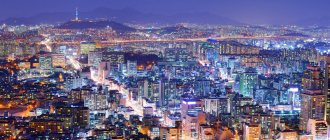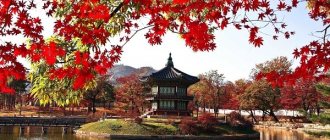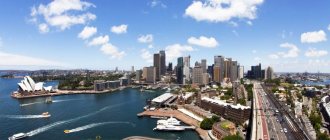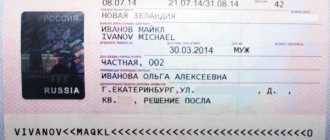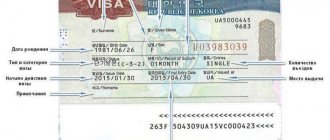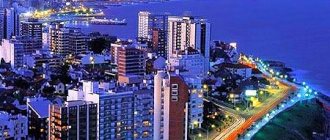Do I need a visa
To travel for any purpose to South Korea, a visa is required, since the visa-free regime has been canceled since April 2021.
You can obtain a visa to the Republic of Korea at the consular section of the country's Embassy. The working hours of the consular department should be clarified in advance.
Before applying for a visa, you will need to obtain medical insurance that covers cases of COVID-19 infection.
You can purchase insurance yourself online within 5 minutes.
Photo requirements in 2021
To obtain a visa you need 1 photo.
Photo requirements:
- color photo, without blur, with a clear and focused image, white background;
- good quality printed image;
- photo size – 35 by 45 mm;
- retouching cannot be used.
A sample photo can be found on the official website of South Korea in the Russian Federation.
Visa photo sizes
Image requirements:
- Clothing should be in contrast to the white background. It is best to dress in black or dark blue clothes. The outfit should be strict, without an open neckline, it is better to cover your shoulders. Business attire is encouraged;
- The applicant’s face is photographed strictly from the front so that important facial details – nose, eyes, mouth – are clearly visible;
- The photograph should be taken in such a way that the color of the eyes is clearly visible, the arch of the eyebrows, the shape of the ears, nose, chin, shoulders and crown are visible. Such details are necessary to clearly identify the applicant in the photograph;
- The facial expression is neutral. A slight smile is allowed, without exposing teeth. Excessive facial expressions distort the real image, which may complicate the issuance of a visa;
- The total volume of the face from the entire photo is 70 – 80;
- Transparent glasses are allowed, but the frames should not cover the eyes or eyebrows. There should be no glare in the photo;
- Dark glasses and other accessories are prohibited, as they can distort or obscure an important part of the appearance;
- The hairstyle can cover the forehead, but not so much that the bangs hang over the eyes;
- It is advisable to tie your hair in a ponytail if it is long, since it is unacceptable for it to cover the visible part of the face;
- Head coverings are prohibited, except for representatives of Islam.
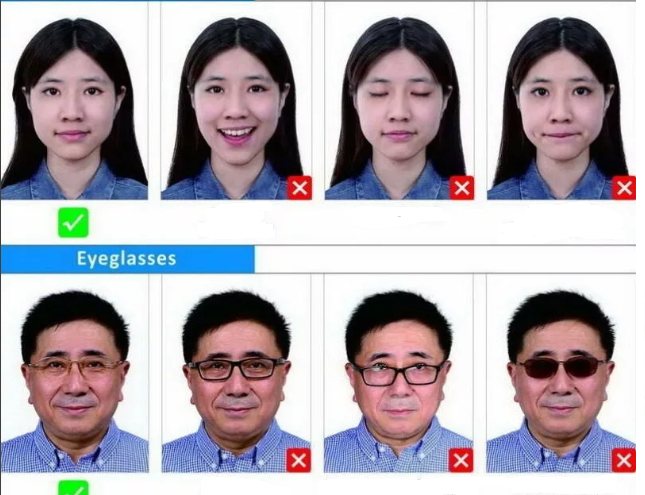
Examples of errors in photographs
The simpler and brighter the photo, the more likely it is to be accepted.
Requirements for a child's photo
Typically, there are no photo requirements for minor children, as they are not required by law to obtain a child visa. To get to South Korea with a child, you need to have his birth certificate and a notarized permission of one of the parents to travel abroad.
Documents for entry of Russians
- International passport valid for at least six months.
- Return ticket.
- Confirmation of accommodation (hotel reservation).
- Migration card and customs declaration (to be completed on the plane).
- Financial guarantees (cash, bank card statement, certificate of employment, travel voucher).
Entry with a child
- Children over 14 years of age must have their own passport.
- To travel unaccompanied or accompanied by third parties, it is necessary to obtain a notarized consent to travel and stay abroad.
Business visa D-8 to South Korea
It is advisable for first-time applicants to seek the help of a specialist. Identification of any discrepancy is fraught with complications in obtaining a business visa in the future. Types of entry permits D-8
- Category D-8-1 is aimed at investors willing to invest 100,000,000 won. or more to one of the local corporations.
- The D-8-2 variety is suitable for investors planning to invest money in a venture business.
- Type D-8-3 is awarded to foreigners who can invest at least 100,000,000 won in a private business.
- Permission D-8-4 can be issued by the founders of companies.
List of documents
An applicant applying for any type of D-8 visa to South Korea must submit in 2021:
- registration form containing the personal data of the Russian;
- international passport;
- standard photo;
- alien registration card.
Lists of additional documents required (taking into account the category of business entry permit) are given below.
A D-8-1 business visa is issued on the basis of the following documents:
- a notarized copy of the statement indicating a change in the composition of shareholders;
- copies of the company registration certificate;
- an order confirming the fact that the employee was sent abroad;
- a certificate issued to an investment company registered abroad;
- documentary confirmation of the transfer of funds invested in the company (you can present: a document on the transfer of money, issued by the customs service or a banking organization; a certificate issued by the customs authority confirming the fact of investment in kind; trade and other documents).
A business visa category D-8-2 is issued if you have:
- business registration certificates (copies);
- documentary evidence of the activities of the venture company (in the absence of such, plans for its creation are provided);
- corporation registration certificates;
- place of residence in South Korea (presentation of a rental agreement, receipts for utility bills, etc. is required);
- a patent/document confirming the fact that a foreigner has the right to an intellectual property;
- office rental agreements;
- documentary evidence of the company’s high technical capabilities;
- trade documentation.
Persons wishing to obtain a business visa category D-8-3 must complete the package with the following documents:
- an order to send an employee abroad;
- a copy of the registration certificate (the presence of the names of the co-founders of the enterprise is checked);
- signed by the co-founders partnership agreement (copy);
- confirmation of initial investment (issued by the Korean co-founder);
- an investment declaration or other documentary evidence of the fact of registration of an investment company;
- documents confirming the introduction of investment funds.
For founders of companies wishing to obtain a D-8-4 visa, the following is provided:
- document confirming education (minimum level - bachelor);
- copies of patent/enterprise registration cards;
- an application issued by the South Korean Intellectual Property Office (relevant for Russians applying for a patent);
- trade documentation;
- a document confirming the status of a participant in the OASIS program, or a certificate of completion (the program is designed for persons with foreign citizenship who open their own business);
- documentary evidence of points accrual;
- office rental agreements.
Employees of South Korean missions have the right to request other information and documents.
Submission of documents
Lawyers for the Investor Visa website recommend paying attention to the fact that Russians wishing to apply for a business visa to South Korea in 2021 can submit a package of documents to the Consulate General of South Korea (representative office located in Moscow).
In addition, the possibility of contacting immigration departments operating in the territory controlled by South Korea has been implemented. The second application option implies the need to obtain a unique certified number from the mentioned structures, without which it is impossible to complete the procedure for issuing a business visa in the territory of a foreign country.
Features of entry into South Korea
No later than 48 hours before crossing the border, you must undergo a medical examination to confirm the absence of coronavirus symptoms. You must obtain the appropriate certificate from your doctor and have it translated into English or Korean.
A health certificate must be presented upon check-in for a flight to Korea, as well as upon request by the border guards of the Republic of Korea.
Fingerprinting and digital photography
All persons over 17 years of age must undergo fingerprinting and digital photography upon entry into Korea. Otherwise, entry will be denied.
PCR test
- There is no need to take a PCR test before departure.
- Upon arrival, you must take a PCR test at the airport at your own expense.
Quarantine
Regardless of the results of the PCR test, all persons crossing the border must undergo a 14-day quarantine:
- It is permissible to stay only in hotels or premises specially designated by the state or local government (observatory hotels).
- Accommodation is fully paid for by the foreign citizen (cost: minimum 150 thousand won per day per person). Staying in quarantine will cost approximately $1,600 per person.
Foreign citizens who violate quarantine and rules of stay in Korea are subject to deportation from the country. They are also required to pay a fine of 10 thousand US dollars.
Consular registration
The South Korean authorities recommend that all foreigners undergo the procedure of consular registration at the Russian Embassy. This is necessary to maintain contact with the Embassy in emergency situations.
Entry without a visa to Korea
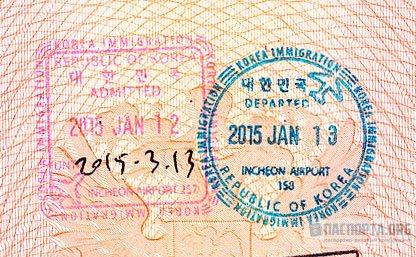
Entry stamp to Korea. Photo from 2f.ru.
South Korea is very attractive for tourists who live in the Far East, since it is much closer for them to fly to this country than to Moscow. Therefore, if they want to see something new, travelers go there. In order to simplify bureaucratic procedures, South Korea and the Russian Federation have adopted a mutual visa-free regime.
In order for a visa to South Korea to be issued automatically at the border, you must take a valid foreign passport, the validity of which will not expire within six months from the date of entry into the country.
You will need to provide a migration card; it is issued on the plane or other transport on which the tourist travels.
It is required to fill out a customs declaration, take with you tickets for returning from the state and material proof of the tourist’s well-being.
It is important to know! South Korean border guards are loyal to tourists from the Russian Federation, so they do not find fault with documentation, and the process of obtaining a permit is completed in 5 minutes.
What is a migration card when entering Korea?
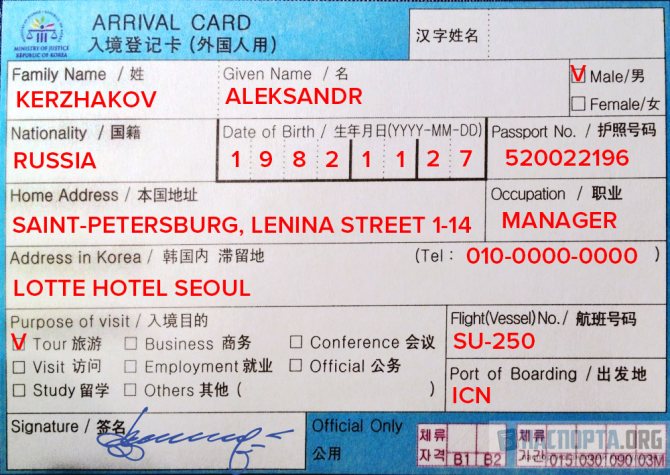
A migration card is a small form on which individual information about the tourist, his address and passport details are recorded. The documents are very easy to fill out - you just need to answer the questions asked.
Sample of filling out the migration card of South Korea (742 Downloads)
Procedure for filling out a migration card:
- Family Name - surname (as in a foreign passport);
- Given Name - name (as in a foreign passport);
- Male / Female - gender: male / female;
- Nationality - citizenship, you can specify RUSSIA or RUSSIAN FEDERATION;
- Date of Birth—date of birth in YYYY-MM-DD format;
- Passport No. — passport number;
- Home Address - home address according to registration;
- Occupation - profession, you can enter the standard MANAGER;
- Address in Korea—address of residence in Korea, you can specify the name of the hotel;
- Tel: — contact telephone number for the address of residence in Korea;
- Purpose of Visit - purpose of the visit: Tour - tourism; Business - business; Conference - conference, symposium; Visit - private visit, visiting relatives, friends; Employment - work; Official - official visit; Study - training; Others - other;
- Flight (Vessel) No. - number of the flight on which you arrived in Korea;
- Port of Boarding - port of arrival;
- Signature - place of signature;
- Official only - do not fill out.
How to fill out a customs declaration correctly?
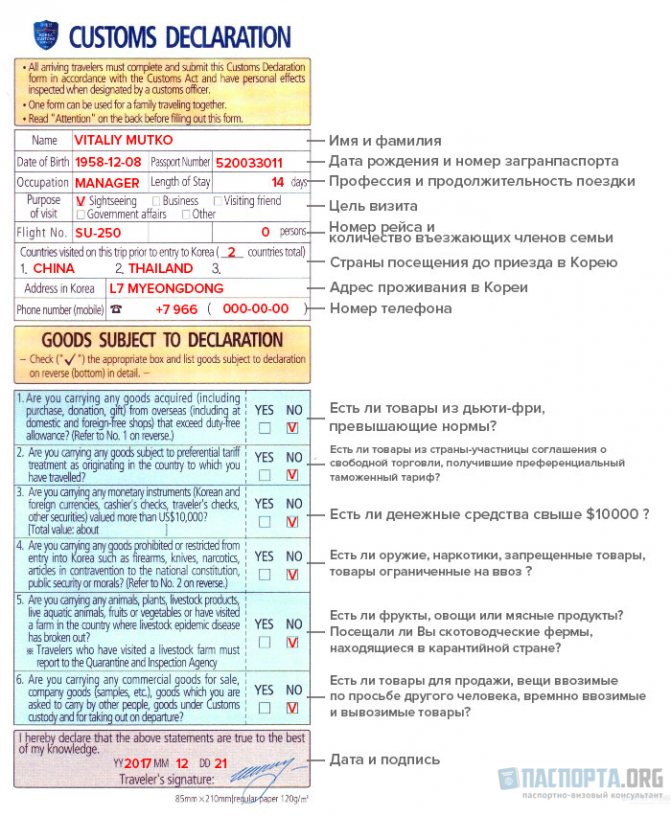
Sample of filling out the customs declaration of South Korea.
To fill out a customs declaration, demonstrate knowledge of English.
If difficulties arise in filling out the forms, contact transport workers.
You cannot import any fruits and vegetables, alcohol - one bottle per person no more than 1 liter, cigarettes - one carton per person.
Sample of filling out the customs declaration of South Korea (537 Downloads)
Procedure for filling out a customs declaration:
- Name - First and last name (as in the international passport);
- Date of Birth—date of birth in YYYY-MM-DD format;
- Passport Number - passport number;
- Occupation - profession;
- Length of Stay / days — duration of the trip in days;
- Purpose of visit - purpose of the visit: Sightseeing - tourism, sightseeing; Business - business; Visiting friend - visiting friends, relatives; Goverment affairs - state affairs; Other - other;
- Flight No. / persons - the number of the flight that arrived in Korea, and the number of arriving family members;
- Countries visited on this trip prior to entry to Korea (__ countries total) - countries visited before arriving in Korea (__ number of countries);
- Address in Korea - Address of residence in Korea, you can enter the name of the hotel;
- Phone number (mobile) — contact phone number.
There are six questions on the customs declaration that must be answered “Yes” or “No”:
- Are there any goods purchased (bought, gifted, purchased for free) in a duty-free store abroad (including duty-free stores within the country) that exceed the limits indicated on the back of the form.
- Are there any goods produced in a free trade agreement country that receive preferential customs tariffs?
- Are there more than 10,000 (10 thousand) US dollars equivalent (travelers' checks, Korean currency and other securities? You should also indicate how much money is available.
- Are there any weapons, drugs, or goods that are not acceptable by law, rules, or traditions of the country, subject to a ban or restrictions on import, indicated on the back of the form.
- Are there flora and fauna objects, their parts and products obtained from them are subject to quarantine inspection. Experience of visiting a livestock farm located in a country where a livestock epidemic has been detected. A visitor to a livestock farm must make a declaration to the main quarantine inspection office.
- Are there goods for sale, goods for use at the enterprise (samples), things imported at the request of another person, goods temporarily imported and exported.
At the end, you must put a date and signature.
Customs regulations
In the Republic of Korea, there is a system of red and green corridors: those who have goods that are subject to mandatory declaration go through the red ones.
You can familiarize yourself with customs regulations on the website of the Russian Embassy in the Republic of Korea.
Duty free:
- Items under $600.
- 1 liter of alcohol.
- 2 ounces of perfume.
- 200 cigarettes, 50 cigars or 250 grams of tobacco.
- Items for personal use.
- Gifts valued up to $600.
Quotas can be summed up for a group of travelers.
The following must be declared:
- Items sold in excess of the free quota.
- Products to be sold in Korea.
- Currency worth more than 10 thousand US dollars.
It is prohibited to carry:
- Materials containing pornography.
- Materials that could potentially disrupt public order (for example, literature from the DPRK).
- Counterfeit coins, banknotes.
- Plants, fruits, soil, fruits of plants.
- Meat and dairy products.
- Fishing industry products without tin packaging.
Advice for Russian tourists coming to South Korea
According to the latest data, the introduction of a visa-free regime led to an increase in the number of Russian tourists in Korea by 36%, and 61% more Koreans came to Russia than a year earlier, when visas were still required for tourist trips. Recently, the South Korean government announced that it would rely on attracting Russians to the country. Thus, according to the plans of the Korean government, by 2017 the number of Russians visiting Korea should double, reaching 350 thousand people.
In general, we can confidently say that Russia and South Korea have a chance to become even closer to each other and get to know each other better. “The more often we go to visit each other, the better we will be able to understand: Russians are Koreans, and Koreans are Russians. The importance of public diplomacy has been growing increasingly in recent years, and therefore a visa-free regime will serve to form a more objective image of Russia in South Korea,” said Andrei Osmakov, Consul General of the Russian Federation in Busan, in an interview with Rossiyskaya Gazeta.
But there is another side to this situation. South Korea is, in any case, a different country with its own rules, customs and laws. There is also a possibility that Russians will be involved in one way or another in certain incidents that will become the subject of investigation by local law enforcement agencies. We asked Russian diplomats, who have a wealth of experience in this area and who communicate with representatives of the Korean authorities almost daily, to share these tips with us about what peculiarities there are in the local legal system, how Russians should behave, what to take into account. For convenience, we have summarized all the recommendations received in the form of a dialogue with a certain “Russian Consul”.
With this publication we continue the series of RG articles devoted to the introduction of a visa-free regime between Russia and South Korea.
"Russian newspaper":
Let's follow the entire chain that a Russian faces when visiting South Korea under a visa-free regime. Where should I start?
Consul:
To begin with, let's say that the official name of the document, which came into force on January 1, 2014, is as follows: Agreement between the Government of the Russian Federation and the Government of the Republic of Korea on the mutual abolition of visa requirements. The introduced new regime does not mean the abolition of visas altogether, and therefore, on the eve of departure, you need to decide whether you need a visa. Let us emphasize right away: regardless of the duration of your visit - even if you are going for one week - you need a visa if you are going to study or work in Korea. You will have to receive it, and this is explicitly stated in the agreement. Visas are not required only for those traveling to Korea for tourism purposes or on a business trip.
“RG”: Judging by the responses, many are interested in the question of the length of possible stay without a visa. It's kind of a confusing system...
"TO":
It's not that complicated, everything is quite simple. The principle is this: within 180 days, that is, in six months, you can visit Korea for a total of no more than 90 days without a visa. But at the same time, each visit cannot be more than 60 days. That is, you have a limit of 90 days in six months, and you “choose” it: you can have 60+30, you can have 30+30+30, you can have nine times ten, etc., but in any case you can’t be more 60 days in a row. That is, 65 + 25 will not work. The 180-day period within which your 90 days is determined is counted from the date you entered Korea. Once it has expired, a new one begins, where you are again allowed to be without a visa for a total of up to 90 days, but no more than 60 days in one visit.
“RG”:
We sorted it out.
I’m traveling as a tourist, and therefore I don’t need a visa, I don’t plan to stay more than 60 days. I started going through passport control and... “K”:
And here again there is one “BUT”, which applies in any country, including South Korea.
Even if you do not need a visa, the country's authorities may deny you entry without giving a reason. As they often write on the visas themselves: “Having a visa does not guarantee your entry into the country. The final decision is made by the migration control officer on site.” And it is useless to be indignant and “demand a consul” here - it is the right of the host country not to let anyone in. And the authorities are not obliged to explain the reason. At the same time, it is useless to contact or call the Russian representation in Korea - the migration service will not explain anything to diplomats, and any attempts to put pressure on it will be interpreted as “interference in internal affairs.” “RG”: Did this happen often in reality?
Based on your experience... "K":
Let's put it this way: when the Korean authorities refused entry, they usually had good reasons for this. They didn’t always voice the reasons, but it was just like “I’m in a bad mood - fly back to Russia” - I don’t remember that. As a rule, they “deployed” those who had previously had some kind of “sin” in Korea: perhaps they had been given a suspended sentence, or were put on the “black list” for one reason or another. In general, all this does not come out of the blue and, as a rule, the “offended” themselves understood “where the legs grow from” such an attitude, but did not always admit it.
“RG”:
It may well be that someone previously had some kind of problems with the law in Korea, he returned to Russia and now wants to visit Korea again.
What do you recommend to those so that he is not immediately sent home on the next plane? "TO":
On the eve of the trip, you need to go to the Korean embassy or consulate, explain the situation and ask the Korean authorities to find out if there are any complaints against him. But only the Korean authorities themselves can do this. Russian diplomats cannot find out this for every Russian, and the Koreans are not obliged to provide us with such information. And if you do this personally, then they should tell you: you can go or there are still some claims against you. And one more thing: you should not hope that you will be able to deceive the system and “slip” through a roundabout route to Korea. Everything is entered into a common database, which the Koreans, with their technology, are in excellent condition. And therefore, at every point of entry - be it at the airport of Seoul, even in Busan, even in the port of Sokcho, in general, anywhere, everyone will know about you. There is a single database here.
"RG": Okay, let's move on. We imagine that we are standing at passport control and started communicating with the officer. What should you consider?
"TO":
Even if you do not need a visa, the officer has every right to ask you where you are going to live. You need to know the exact address of residence. It will be great if you print out the booking sheet from the hotel. This should be enough. There may be other clarifying questions of a general nature, but, as a rule, this does not happen - no one wants to create a queue. Usually, questions begin when your entry document (a small tear-off coupon that is filled out at the entrance) is filled out so that questions inevitably arise. And again I would like to draw the attention of potential students. If you are going to Korea on a tourist visa, but have written that you will live at the university, then you will have questions and you may not be allowed in. Let us repeat: if you are going to study, get a study visa, even if you will only study for a month. If it becomes clear that you have decided to take advantage of the visa-free regime for your studies (and this is directly prohibited by the agreement), then you will most likely be sent back.
“RG”: Okay, we passed passport control and here it is - the long-awaited Korea. What is your general impression of the Korean police? Have you ever heard of law enforcement officers trying to somehow find fault with foreigners, as they say, “out of the blue”?
"TO":
The Korean police simply, without explanation, according to the law, have the right to detain any person for 48 hours, that is, for two days. They must then file charges, extending the detention to 10 days, after which they must transfer the case to the prosecutor's office. But in practice, no one in this country will detain you “just like that.” If you have been detained, believe me, there is most likely a reason.
Korean police are very friendly. If you are lost or don’t know something, feel free to come up and ask, this is perceived as normal. Most likely, a “standard” Korean police officer will be able to say at least a couple of words in English. Many of the police are young guys who serve in the police instead of the army. So there is no need to be afraid of them, and they are friendly. I haven’t heard about any “harassment of foreigners out of the blue.” If you do not violate Korean laws, then no one will even think of approaching you, the police have a lot of their own things to do, and a foreigner is always a difficult situation in legal terms, various formalities and so on. In general, the likelihood that a police officer will start looking for a reason to “extort” something from you is very, very small, almost zero. Here, even a passport is extremely rarely just asked for.
“RG”: Do I need to carry my passport with me?
"TO":
It is better to store it in a hotel safe so as not to lose it yourself through negligence. And just in case, you can make a copy of the first page of your passport and carry it with you. In the vast majority of cases this will be enough.
“RG”: It is clear that Korea is a very safe and civilized country. But maybe there are laws and rules that we may not know about, and therefore we may find ourselves in conflict with local laws simply out of ignorance
?
"TO":
This situation is possible. It's difficult to cover all possible issues, but one feature of South Korea immediately comes to mind. Consider the peculiarities of inter-Korean relations. The country has a National Security Law that prohibits the import and distribution of materials from the DPRK. And this is no joke. This can result in serious punishment, including prison terms. In practical terms, this means that there is no need to bring North Korean newspapers, books, badges to South Korea, or offer to listen to North Korean songs, etc. You should also not agitate for the “Land of Juche” - this also falls under the National Security Law. By the way, the South Korean authorities are blocking Internet access to North Korean websites. And we do not advise you to try to get to North Korean sites from the territory of the South. Overall, don't take any chances with this one. Local authorities will also most likely warn you first, and only then “punish you to the fullest extent,” but they can deport you if you give a reason in this direction.
“RG”: Well, can we talk about politics or is everything too strict?
"TO":
It's already quite liberal here. The opposition is influential in South Korea; many Koreans themselves will be the first to tell you what, in their opinion, their leadership is doing wrong. You can calmly talk, ask, discuss here, including about policy towards the DPRK. Many South Koreans may ask you about this themselves, knowing that Russia is actively cooperating with both Seoul and Pyongyang. This is as much as you want, but, we repeat, there is no need to bring and distribute packs of newspapers from the DPRK. This will be punished quickly and severely.
“RG”: Is there anything else that Korea is strict with?
"TO":
Very strict with weapons, drugs, violence in any form. Any hint of involvement in this means you immediately come under the close attention of the police and intelligence services. The very low distribution of drugs and weapons in Korea is primarily the merit of the authorities. They are fighting this very hard. Even a starting pistol will be considered as a weapon; in general, no “traumatic guns,” “pneumatic guns,” “weed guns,” or anything else.
Korean police officers look very friendly, and they are. But if you have given reason to suspect yourself of something illegal, then this whole system will immediately show its rigidity, thoroughness, and uncompromisingness. This is the case that “everyone is good as long as you are good yourself.” Do not try to offer bribes - this will only complicate the situation and worsen your chances of receiving the most lenient punishment.
“RG”: Let’s say I wanted to stay in Korea, work or study, then...
"TO":
Then you must personally appear at the Immigration Service and find out all the rules and procedures. It is possible that you will still have to leave the country to do this. But only employees of the Immigration Service can answer these questions; the embassy and consulate of the Russian Federation does not have the right to interfere in these issues. Only the applicant himself and only personally...
“RG”: It is clear that no one will look for problems for themselves of their own free will, but in life anything can happen. What are your tips?
"TO":
Standard and well-known: try not to find yourself in such situations, do not visit questionable establishments, if you drink alcohol, do it in moderation. Many “stories” occur precisely after excessive drinking. And you don’t have to give up. Fighting, even if you just push a Korean, is perceived very badly and is punished severely.
There is one peculiarity of Korean legislation. Let's say you got into a fight with someone, and then came to an agreement with him, even paid him money as compensation. But then this person can still go to the police and write a statement against you with all the legal consequences. It is enough for him to bring two witnesses who will confirm his words and the police will begin an investigation. And “we agreed or we didn’t agree”—that’s your problem.
By the way, it’s the same thing if you went to the police, you were interrogated, but then you - the offender and the victim - decided to come to an agreement. If there was any damage and a case was initiated, then the investigation and trial will take place regardless of the fact of reconciliation between the parties. This may be taken into account, but the fact that “the one whose nose you broke no longer has any complaints” is not an argument for the Korean Themis. Once a case has been opened, it must be completed and the culprit punished.
“RG”: Let’s say that for one reason or another a Russian found himself in some unpleasant situation, he was brought to the police station and began to be interrogated. What do you advise?
"TO":
If you don’t speak Korean confidently, ask for a Russian translator. This is your right, which they are obliged to fulfill and will fulfill. Demand clearly and adamantly - this is not the first time that the Korean police have encountered Russians, they have lists of people who help them as translators, so demand. If you think that the translator does not speak Russian well and does not provide the proper level of mutual understanding with the police representative, ask for a replacement translator. This is again your right. And demand that the consulate or embassy be notified. The police should also do this at your request.
“RG”: Maybe something else when communicating with the police?
"TO":
General rule: if you don’t understand something, never sign, ask for clarification and translation. If you were released after being handed “some pieces of paper”, do not throw them away, but figure out what they are. There are frequent cases when a person was released, obliging him to appear upon request. And if you don’t show up, it will be interpreted not in your favor and the maximum possible punishment will be imposed. There were cases when compatriots were released from the police, they left, and then at the border, when they returned to Korea again, immigration would no longer let them in. It turned out that the case was not closed, the Russian was summoned for repeated interrogations, although he had already gone abroad, then a trial, a verdict in absentia and a “black list”. So make sure that there are no more claims against you, and do not throw away any documents or certificates you have received. Koreans have an open judicial system and on the corresponding websites you can find out everything by your case number - what the result is, sanctions, etc.
“RG”: What line of behavior do you recommend choosing?
"TO":
From experience in dealing with various conflicts, I will say that there are two tactics of behavior. Some categorically deny everything completely and say: “Just try and prove it!” The latter admit everything and ask for leniency. Therefore, if there really was an incident and you were taken “into the case,” then you must confess and repent. Most likely (if the conversation is not about serious crimes) you will simply be deported and given a suspended sentence. And then you can enter again, you just need to make sure that your “non-entry period” has expired. And there is no need to show off, saying, “where are my fingerprints and other objective evidence,” knowing that in fact “something happened.” Based on circumstantial evidence, they can assign a serious sentence, and this is most likely what will happen. The Korean court does not like such self-confident suspects.
“RG”: The “beach holiday” season will begin soon, what should we keep in mind?
"TO":
Keep in mind that in Korea the swimming season is only from mid-July to the end of August. Many beaches close at night. This is especially true for small towns and villages. It is better not to go to closed beaches at night, and also during the non-swimming season. Even during the swimming season, no one will let you swim far. Usually an area is fenced off where you can reach the bottom with your feet - and splash around there. And if you decide to swim further away, then the rescuers will immediately return you back. So the situation here is somewhat different than on the beaches familiar to Russians.
We also strongly advise against taking photographs of local girls in swimsuits - at least without their explicit and clear consent to do so. On all major beaches, announcements are constantly made asking people to report such “photographers” to the police. We know of a case where Indonesians were detained for photographing Korean women on the beach and then deported.
“RG”: Many people perceive eastern countries as analogous to Thailand in terms of the prevalence of the sex industry.
"TO":
Wrong country. It is prohibited in Korea, although it is present in one form or another. And everyone will answer - the “priestess of love” herself, the pimp and the client. In general, this exists, but it is punishable, and therefore we do not recommend it.
“RG”: And finally, a few words about transport, traffic on the roads.
"TO":
Yes, public transport is convenient here. There is a very well developed bus service, excellent high-speed KTX trains, and reasonable taxi prices. A convenient and clean metro, which is available not only in Seoul, but also in other large cities - Busan, Daegu, Incheon. In general, public transport is very good, but there are a lot of cars on the roads, and therefore you need to be careful. Cars sometimes drive through a red traffic light, they may try not to let pedestrians pass, etc., although, as they say, this does not amount to “lawlessness on the roads,” there is generally order here.
“RG”: Recently, many Russians have been actively using car rental, and now the number of potential conflict situations is increasing. Your advice, comments?
"TO":
Yes, when Russians get behind the wheel, they often begin to look at Koreans differently. On the other hand, there are simply wonderful roads here, a convenient road numbering system. As for advice... Firstly, don’t delude yourself that you rarely see the transport police. Everything here is in cells, and therefore when needed, they will appear very quickly. The “Korean style” of driving should also be taken into account: some may not use turn signals when changing lanes. The driving style of taxi drivers and buses is often similar to our minibuses: sudden lane changes, fairly aggressive driving, can cut you off, and therefore you need to be careful with them. I wouldn’t say about ordinary Koreans that they are better or worse drivers than Russians.
“RG”: Nobody wants to get into an accident, but it’s better to know how to behave. What are your tips?
"TO":
Of course, it is better to let a reckless driver pass, even if he is wrong, than to get into an accident with him. Litigations usually take place between commissioners of insurance companies, and therefore it is important to take out insurance when renting a car. There is one Korean peculiarity: even if you are innocent by Russian standards, but committed a movement, then some part of the insured amount will be “hung” on you. It may be 10-20%, but it is rarely accepted that only one side is entirely to blame. This is a general approach and not an attempt to deceive foreigners. Perhaps you have to stand in a parking lot or in front of a traffic light for 0% to be written down. Otherwise, even if it is entirely the other party’s fault, they will also write you at least 5%.
In the case of pedestrians, it is better to let them pass everywhere and always, even if they cross in the wrong places. If you hit someone while driving, even if the pedestrian violated the rules, then 99.9% of the time the driver of the car will be found guilty. The situation is similar with motorcycles and mopeds. They drive very dangerously, but if there is a collision, then, from the police point of view, the car will most likely be at fault. The principle here is this: whoever is weaker and more vulnerable is right, according to the police. This is what we were told at one time in the Transport Police Review Group. Therefore, be very careful with pedestrians, mopeds, and motorcycles.
“RG”: Well, maybe you want to say something to those who are planning to come to Korea?
"TO":
We've done a lot of work to answer most common questions up front. Therefore, we strongly advise you to visit the website of our embassy in Seoul and consulate general in Busan (listed below in the “help” - RG note) - there are tips, recommendations and other useful information, including the full text of the Agreement on the mutual abolition of visa requirements. We advise you to write off your emergency phone number from the website just in case.
If you still have questions, please contact us on our pages on Facebook, Twitter or by email. We are always in touch. We respond very quickly on social networks, and by email we also respond promptly—about three to five days.
We also advise you to register with the consulate. This can be done by visiting the representative office in person, but it can also be done through our websites - there are links there. This will take no more than 5-10 minutes. From time to time it happened that we needed to urgently contact one of the Russians in Korea, but there was no contact information. The question may arise: “Why all this?” The answer is: “Anything can happen.” Who knows what could happen at home, with your family or again with you. It may be necessary to tell you something urgently, but they contact us - the consulate or embassy. It's in your best interest.
But overall, we wish you a pleasant stay. South Korea is an interesting country with rich culture and traditions, we hope that when you come here you will only get good impressions.
useful links
Website of the Russian Embassy in Seoul Website of the Russian Consulate General in Busan
